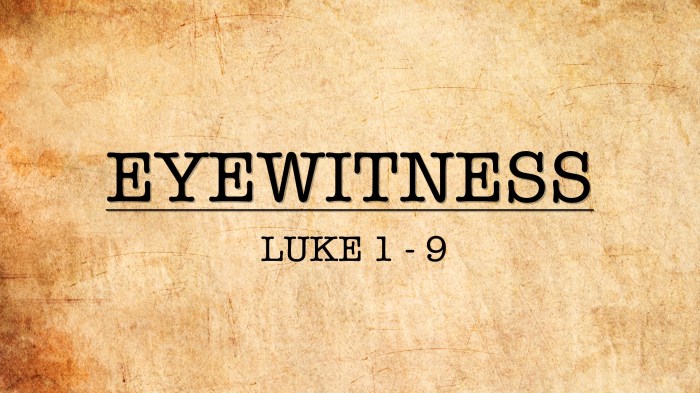Was Luke an Eyewitness of Jesus? This question has intrigued scholars and theologians for centuries, and it is a question that continues to be debated today. In this essay, we will explore the evidence for and against the idea that Luke was an eyewitness of Jesus.
We will examine the historical evidence, the literary analysis of Luke’s Gospel, and the comparison with other Gospels. We will also consider the archaeological and geographical evidence, as well as Luke’s purpose and audience. By the end of this essay, we hope to have a better understanding of whether or not Luke was an eyewitness of Jesus.
Historical Evidence

There is no definitive evidence from ancient texts or historical records that explicitly states whether Luke was an eyewitness of Jesus. However, there are several pieces of circumstantial evidence that suggest he may have been.
One such piece of evidence is Luke’s own testimony in the Gospel of Luke. In the prologue to his gospel, Luke writes that he has “carefully investigated everything from the beginning” and that he has written his account “in order that you may know the truth concerning the things about which you have been instructed” (Luke 1:3-4).
This suggests that Luke had access to firsthand accounts of Jesus’ life and ministry.
Another piece of evidence that suggests Luke may have been an eyewitness of Jesus is the fact that he was a close associate of the apostle Paul. Paul was one of Jesus’ most important followers, and he was instrumental in spreading the Christian message to the Gentiles.
Luke traveled with Paul on several of his missionary journeys, and he would have had ample opportunity to hear firsthand accounts of Jesus’ life and ministry from Paul.
Finally, Luke’s writings display a deep understanding of the Jewish culture and customs of Jesus’ time. This suggests that he was either a Jew himself or that he had spent a significant amount of time in Jewish communities. This familiarity with Jewish culture would have given Luke a unique perspective on Jesus’ life and ministry.
Reliability and Credibility of Sources
The reliability and credibility of the sources that suggest Luke may have been an eyewitness of Jesus are difficult to assess. The Gospel of Luke was written several decades after Jesus’ death, and it is possible that Luke embellished or exaggerated some of the details in his account.
Additionally, Luke was a Christian, and this may have influenced his perspective on Jesus.
However, there is no evidence to suggest that Luke was deliberately trying to deceive his readers. He seems to have been a careful and accurate historian, and his account of Jesus’ life and ministry is generally consistent with the accounts of other early Christian writers.
Literary Analysis of Luke’s Gospel

The Gospel of Luke exhibits a unique literary style and structure that provides valuable insights into the author’s perspective and potential eyewitness status.
One notable feature of Luke’s Gospel is its extensive use of first-hand accounts and personal observations. Luke frequently employs the phrases “I have investigated everything carefully from the very beginning” (Luke 1:3) and “I have decided to write an orderly account” (Luke 1:3), indicating a thorough and systematic approach to gathering information.
Use of First-Hand Accounts
- Luke includes numerous anecdotes and stories that provide intimate glimpses into Jesus’ life and teachings.
- He records conversations between Jesus and his disciples, as well as parables and miracles that demonstrate Jesus’ character and mission.
- These accounts suggest that Luke had access to individuals who had direct interactions with Jesus, enabling him to accurately convey their experiences.
Comparison with Other Gospels

Comparing Luke’s Gospel with the Gospels of Matthew, Mark, and John provides valuable insights into Luke’s eyewitness status. While all four Gospels share a common narrative of Jesus’ life and ministry, they also exhibit unique perspectives and emphases that may reflect the authors’ own experiences and sources.
Similarities
- Common Material:Luke’s Gospel shares a significant amount of material with the Gospels of Matthew and Mark, known as the “Synoptic Gospels.” This shared material includes many of Jesus’ teachings, parables, and miracles.
- Chronological Order:Like Matthew and Mark, Luke’s Gospel generally follows a chronological order in narrating Jesus’ life, beginning with his birth and ending with his resurrection.
Differences
- Expanded Narrative:Luke’s Gospel contains a more extensive narrative than Matthew and Mark, particularly in the infancy and childhood of Jesus. This suggests that Luke had access to additional sources or traditions not available to the other evangelists.
- Emphasis on the Holy Spirit:Luke’s Gospel places a strong emphasis on the role of the Holy Spirit in Jesus’ life and ministry. This emphasis is evident in the accounts of Jesus’ baptism, temptation, and Pentecost.
- Focus on the Poor and Marginalized:Luke’s Gospel contains numerous parables and teachings that focus on the plight of the poor, the marginalized, and the oppressed. This emphasis reflects Luke’s own concern for social justice and equality.
Conclusion
The comparison of Luke’s Gospel with the other Gospels suggests that Luke may have been an eyewitness to some of the events he records. His expanded narrative, emphasis on the Holy Spirit, and focus on the poor and marginalized all point to a deep understanding of Jesus’ life and ministry.
While the question of Luke’s eyewitness status cannot be definitively answered, the evidence from comparative analysis strongly suggests that he had access to firsthand accounts and traditions that shaped his Gospel’s unique perspective.
Archaeological and Geographical Evidence
Luke’s Gospel contains numerous references to specific places and events, providing a wealth of information for historical and geographical analysis. By examining the accuracy and consistency of these details with the archaeological record, we can assess whether Luke had firsthand knowledge of the places and events he describes.
Archaeological Findings, Was luke an eyewitness of jesus
Archaeological excavations in Judea and Galilee have uncovered numerous sites and artifacts that corroborate Luke’s accounts. For instance, excavations at Nazareth have revealed a first-century synagogue, consistent with Luke’s description of Jesus’ early ministry (Luke 4:16-30). Similarly, archaeological findings at Capernaum, including a synagogue and a house believed to be Peter’s, support Luke’s portrayal of Jesus’ activities in that region (Luke 7:1-10; 8:40-56).
Geographical Descriptions
Luke’s Gospel also provides detailed geographical descriptions, which have been confirmed by modern scholarship. For example, Luke’s account of Jesus’ journey from Jericho to Jerusalem (Luke 19:1-28) accurately reflects the topography of the region, including the steep ascent of the Mount of Olives.
Moreover, Luke’s description of the Sea of Galilee (Luke 5:1-11) corresponds with modern observations of its size, shape, and surrounding settlements.
Luke’s Purpose and Audience: Was Luke An Eyewitness Of Jesus

Luke’s Gospel is widely acknowledged to have been written with a specific purpose and intended audience. Understanding these factors is crucial for assessing how Luke portrayed Jesus and the events surrounding him.
Luke’s Purpose
Scholars have proposed various purposes for Luke’s Gospel, including:
- To provide an eyewitness account of Jesus’ life and ministry, based on the testimonies of those who had known him personally.
- To convey a theological message, emphasizing the universal nature of God’s salvation and the importance of following Jesus’ teachings.
- To address the needs of a particular community, such as the Gentile converts in the Roman Empire.
Luke’s Audience
The intended audience of Luke’s Gospel is also a subject of scholarly debate. Some scholars believe that Luke wrote primarily for a Gentile audience, while others argue that he wrote for both Jewish and Gentile readers. Regardless of the specific audience, it is clear that Luke intended to convey his message to a diverse group of people.
FAQ Section
Was Luke a companion of Paul?
Yes, Luke was a companion of Paul and traveled with him on his missionary journeys.
What is the evidence that Luke was an eyewitness of Jesus?
There is no definitive evidence that Luke was an eyewitness of Jesus, but there are several pieces of evidence that suggest that he may have been. For example, Luke’s Gospel contains many details that are not found in the other Gospels, and these details suggest that Luke had firsthand knowledge of the events that he describes.
What is the significance of Luke’s Gospel?
Luke’s Gospel is one of the most important sources of information about the life and teachings of Jesus. It is a valuable resource for scholars and theologians, and it has been used by Christians for centuries to learn more about their faith.